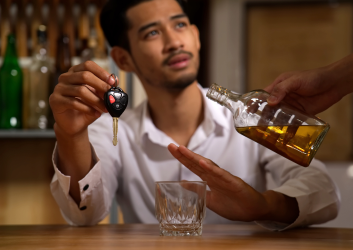Top Tips for Avoiding a DUI Conviction

March 29, 2011
Understanding DUI Convictions
A DUI conviction can have far-reaching consequences, affecting your driving record, employment opportunities, and personal relationships. The penalties for your first DUI conviction include fines, license suspension, mandatory DUI education programs, and even community service. A second DUI conviction typically results in more severe penalties, such as longer license suspensions, higher fines, mandatory alcohol treatment programs, and possible jail time.
Understanding the severity of these consequences highlights the importance of preventing DUI incidents. Recognizing the impact of a DUI on your life is the first step towards making safer choices.
Key Tips for DUI Prevention
- Plan Ahead: If you plan to consume alcohol, arrange for alternative transportation in advance. Options include using a taxi service, ride-sharing apps like Uber or Lyft, or designating a sober driver. Asking yourself questions like, “Should I take a taxi? Should I get a ride? Should I stay over?” can help you make safer decisions.
- Stay Informed: Be aware of DUI checkpoints in your area by checking local listings or using a DUI Checkpoint Location service. This knowledge can help you avoid areas with high police presence and reduce the likelihood of being stopped.
- Maintain Your Vehicle: Ensure all lights, signals, and your license plate are in working order. A fully functioning vehicle reduces the risk of being stopped for minor infractions that could lead to further investigation. Regularly check your taillights, headlights, turn signals, and license plate lights. Keeping your registration current is also crucial.
- Follow Traffic Laws: Adhere to all traffic laws to avoid drawing attention to yourself. Avoid speeding, stay in the correct lane, and make full stops at traffic signals and stop signs. These behaviors minimize the chances of being stopped by police. Drive cautiously, especially at night, as this reduces the likelihood of police scrutiny.
- Know Your Rights: If you are stopped, remain calm and polite. Roll down your window, keep your hands visible, and have your license, registration, and insurance ready. If the officer starts asking questions beyond the necessary documentation, politely decline to answer. You can calmly and firmly state that you have been advised by your lawyer not to answer any questions and that you have the right to remain silent.
Avoiding a Second DUI Conviction
If you have previously been convicted of a DUI, it’s imperative to be even more cautious. The penalties for your first DUI conviction include fines and education programs, but a second DUI conviction can lead to much harsher consequences. Here are some additional tips to avoid a second DUI conviction:
- Seek Professional Help: If you struggle with alcohol, consider seeking counseling or joining support groups to address any underlying issues. Professional help can provide you with the tools and support needed to manage your alcohol consumption effectively.
- Use Technology: Utilize apps and devices that monitor your alcohol intake and alert you when you’re over the legal limit. These tools can help you make informed decisions about whether it’s safe to drive.
- Reevaluate Your Habits: Make lifestyle changes that reduce your reliance on alcohol, especially before driving. Consider limiting your alcohol consumption or finding alternative activities that don’t involve drinking.
Legal Consequences of DUI Convictions
Understanding the evidence needed for a DUI conviction can help you navigate the legal process if you are charged. The prosecution must prove that you were impaired while driving, often using field sobriety tests, breathalyzers, or blood tests. Knowing your rights and the limitations of these tests can be beneficial.
- Field Sobriety Tests: These tests can be declined. Politely tell the officer that you will not perform any field sobriety tests, including eye, coordination, or balance tests.
- Preliminary Alcohol Screening (PAS) Test: This test is also voluntary in many states. Refusing it can sometimes work in your favor. However, be prepared to comply with mandatory breath or blood tests if required by law.
- Breathalyzer and Blood Tests: In almost every state, you must submit to a breath or blood test if asked. If given a choice, opt for a breath test over a blood test, as it is generally less invasive and can be challenged more effectively in court.
DUI prevention tips not only help you stay safe but also keep you informed about the potential legal consequences. Following these steps can reduce the risk of a DUI conviction and help you make more informed decisions if you find yourself in a difficult situation.
Frequently Asked Questions about DUI Prevention
Q:What should I do if I’m stopped at a DUI checkpoint?
A:Remain calm, provide requested documentation, and politely decline to answer questions or perform field sobriety tests. Knowing your rights can help you handle the situation confidently.
Q:Is it better to refuse a breathalyzer test?
A:Refusing a breathalyzer can lead to automatic license suspension in many states. If given a choice, opt for a breath test over blood or urine tests, but be sure to know your local laws and the consequences of refusal.
Q:How can I avoid a DUI altogether?
A:The best way to avoid a DUI is not to drive after consuming alcohol. Use alternative transportation methods, plan ahead, and make informed decisions about your alcohol consumption.
By following these tips and understanding the legal landscape surrounding DUI convictions, you can make informed decisions and reduce your risk of facing severe penalties. Stay safe, be proactive in your approach to DUI prevention, and always prioritize responsible decision-making when it comes to alcohol and driving.

Leave a Reply
Your email address will not be published. Required fields are marked *